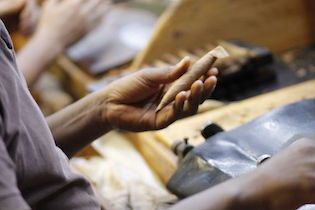New rules passed by the Obama administration will lead to dramatic cuts for cigar manufacturers and cost them hundreds of thousands of dollars, effectively wiping out any small or new business owners.
The Food and Drug Administration released the 499-page plan, which requires manufacturers to follow a strict set of regulations for their products to hit the market.
Walter Cukier, a representative of Perdomo Cigars, said he is confused about the new regulations and its "huge swaths of unclear language."
Cukier said the new regulations would affect his bottom line.
"This new regulation is the windfall the government will collect for those companies who wish to remain open," Cukier said. "The government is expecting hundreds of millions in instant taxation.
"Premium cigar sales make up less than a percent of all tobacco sales every year. Our industry is being crushed by the weight of the rest of the industry for the convenience of bureaucrats."
The administration released its final rule May 5, which subjects e-cigarettes, pipe tobacco, hookah tobacco, and premium cigars to new regulations under the FDA. If the rule is not challenged, it will take effect Aug. 8.
The regulation says that any new cigar products must go through a rigorous and costly application before it can go on the market. The same thing was enforced for cigarettes under the Tobacco Control Act of 2009.
The Associated Press reported in 2012 that the FDA has been slow to approve any new products.
"Tobacco companies have introduced almost no new cigarettes or smokeless tobacco products in the U.S. in more than 18 months because the federal government has prevented them from doing so," the AP reported.
Cukier said that "this legislation marks the beginning of the end as it is unlikely for any new [cigar] product to be approved."
The cigar industry and its customers have largely relied on new products each year. However, the imposed verification process will radically slow the rate of new cigars going on shelves as well as the number of new cigars in general.
Jason Wood, vice president of Miami Cigar and Company, said that customers will have to focus more on brand loyalty and stick to a product they like that was made before February 2007.
"[Customers] are used to being able to go in each time and say, ‘What’s new?’ and smoke a new cigar every single time and get all excited about limited editions," Wood said. "They’re not going to be able to have those experiences like they used to because there really won’t be that many releases on an annual basis."
Scott Drenkard, a writer for the Tax Foundation, reported that by the FDA’s own appraisal, the "new regulation would wipe out somewhere between 10 and 50 percent of [cigar] products as it will not be cost effective to put many of the products through review."
While large-scale cigar manufacturers may be able to adapt to the regulation, small business owners that have launched their own manufacturing company will have to fight to keep afloat.
Gary Liotta, the owner of Santiago Cigars, incorporated his business in 2009 and has more than 40 brands. The FDA’s review is estimated to cost $100,000 per brand to undergo the premarket review, which would cost Liotta an estimated $4 million if he were to submit his 40 cigar brands to the administration.
"If [the act] is left to stand untouched, it will put us out of business," Liotta said.
The FDA outlines the need for regulation in order to "protect Americans from the dangers of tobacco and nicotine, especially our youth."
"As cigarette smoking among those under 18 has fallen, the use of other nicotine products […] has taken a drastic leap. All of this is creating a new generation of Americans who are at risk of addiction," the FDA said.
Cukier said that there is no youth culture focused on going out to smoke premium cigars.
"The idea of minors smoking cigars is a very long overreach," Cukier said.
Wood said the FDA doesn’t know the cigar industry and if they had ever been inside a cigar shop, they would see no minors in the store because of the "intimidating-like atmosphere."
Glynn Loope, executive director of the Cigar Rights of America, told Cigar Aficionado that the associations are focusing on two parts right now.
"One is advancing the legislation … which calls for an exemption on premium and large cigars, and getting that through the full House of Representatives and adopted by the Senate, which probably won’t happen until this year," Loope said. "Secondly, we’re going to be evaluating immediately all of our legal options for litigation."
